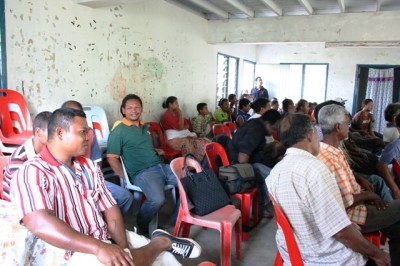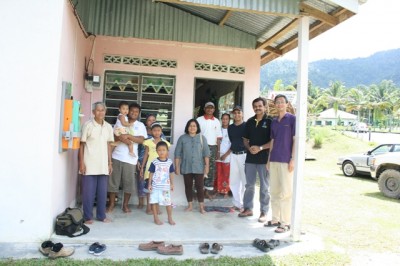This post is an edited version of the Ram’s post here.
Kampung Sungei Genting is accessible either via Chenderiang in Tapah or Kuala Dipang in Kampar. However I was advised to take the Chenderiang route as the recent downpour had caused some landslides along the way.
 The talk on Orang Asli land rights was organized by the Tok Batin (village headman) of Kampung Sungei Genting, Bah Ngah and Malaysian Care’s Wong Young Soon, and was jointly conducted by Augustine Anthony, the Bar Council Human Rights Committee member in charge of Orang Asli matters, Tijah Yok Chopil, the adviser to Perak Network of Orang Asli Villages and myself. Tok Batins from nine neighbouring villages including senior lawyer CK Leong together with his wife were among the 50 participants who were gathered there for the session.
The talk on Orang Asli land rights was organized by the Tok Batin (village headman) of Kampung Sungei Genting, Bah Ngah and Malaysian Care’s Wong Young Soon, and was jointly conducted by Augustine Anthony, the Bar Council Human Rights Committee member in charge of Orang Asli matters, Tijah Yok Chopil, the adviser to Perak Network of Orang Asli Villages and myself. Tok Batins from nine neighbouring villages including senior lawyer CK Leong together with his wife were among the 50 participants who were gathered there for the session.
The residents here live in extremely compact two bedroom houses built under the “Projek Perumahan Rakyat Termiskin” (PPRT) scheme. Though the houses looked neat, the locals confessed that they are far from being comfortable as the building materials used were not from natural resources which they are accustomed to – with reference to zinc and asbestos as opposed to attap/rattan and bamboo.
Numbering 450 persons, the villagers belong to the Semai ethnic group and constitute 70% Christians and 30% Muslims. Most of them are employed in the construction and plantation sectors.
Our talk mainly focused on the legal aspects of Orang Asli (native) customary land, foraging rights, the Aboriginal Peoples Act and problems faced by their community. At the conclusion of our talk, we opened the floor for an interactive Q & A session.
Several pressing, problematic and demanding matters were discussed. One Bah Amin complained that his application to reserve a certain parcel of their native customary land as a football field for the community was rejected by the authorities but was subsequently given away to outsiders.
A distraught Bah Suhab Bin Hussein brought to everyone’s attention the rampant deprivation of their customary land and how they cry and crave for justice. Imperceptibly, their native land he added would furl into the clenches of conceited “bigwigs” supported by the state government without due regard to the local dwellers’ imperative reliance on natural resources.
Concerned Bah Matai wanted to know of ways and means to secure their native customary soil.
Another disappointed woman known as Anney complained that the authorities had failed to compensate her for trees felled under the PPRT scheme. Claiming the trees no longer belonged to her, the authorities instead sold them without any entitlement to her.
A far-reaching initiative suggested by Bah Yamin is to have law awareness programmes for the younger generation. Perhaps he seemed to have the answer to all the problems above as education is the fundamental tool to secure a stronger standing in the community. He lamented that Jabatan Hal Ehwal Orang Asli (JHEOA) had for the past 52 years displaced them, and millions of ringgit allocated annually for organized resettlement as well as economic and social development has hardly reached them. He strongly felt that it is high time JHEOA be governed by themselves instead. The residents are indignant over JHEOA’s inaction to address their problems.
It is indeed a pity to note that as minorities, the Orang Asli have managed to strive within their rich and unique culture and traditions but of late, coupled with the state’s political crisis, the refutation of their statutory rights, land grabs and non-recognition of their co-existence is recurring. The state should instead take the lead to safeguard the interests of their communities by continuous consultation with them and the adoption of a formal policy or blue print for implementation. It is misleading to say that the state is “giving” land to the Orang Asli because their ancestral lands have always been theirs.
Meanwhile pertaining to their land problems, we have requested for necessary documentation from the Orang Asli before proceeding to our next cause of action.
 At the end of the session, Bah Ngah invited the entourage to his humble home for a good spread of Orang Asli lunch. A disturbing sight awaited us.
At the end of the session, Bah Ngah invited the entourage to his humble home for a good spread of Orang Asli lunch. A disturbing sight awaited us.
Along our way we witnessed nature’s fury (or maybe man-made) at its worst – the sole bridge linking the Orang Asli village to the neighbouring villages had been completely washed away by the recent floods. Large portions of the road had caved in as well. We had to manoeuvre dangerously on what’s left of the road. I was told the first indication that a flood was coming was by the sound of surging water heard by the locals there. They claim that the source of flooding is due to the North South Highway which intersects their village. Hence, the sluggish narrow river is unable to sustain the high volume of rain water displaced by the highway.
Whether the authorities are going to alleviate the Orang Asli woes is anyone’s guess.
Ram is the Executive Officer for the Bar Council Perak Legal Aid Centre and Perak State Bar’s Legal Aid and Human Rights Sub-Committee. The views expressed here are personal to the writer and may not necessarily represent the position of the Bar. The Malaysian Bar on 14 March 2009 unanimously passed a strong resolution reiterating the call, among others, to promote and protect the rights of our indigenous.

The village headman should have a lot of responsibilities for maintaining the whole project.
Umno dogs.Stop stealing from the Orang Asli.They are the original inhabitants of Malaysia and we are all living on their soil so have some respect you umno bastards.